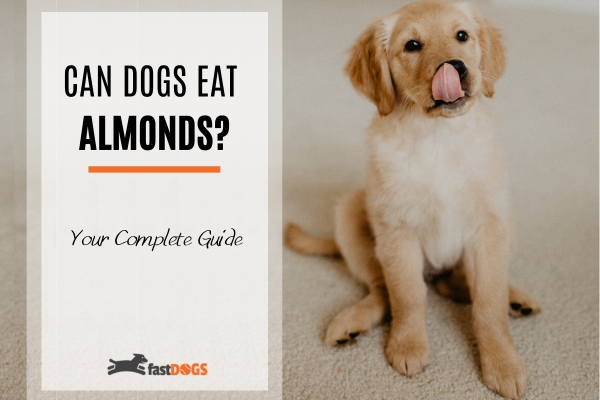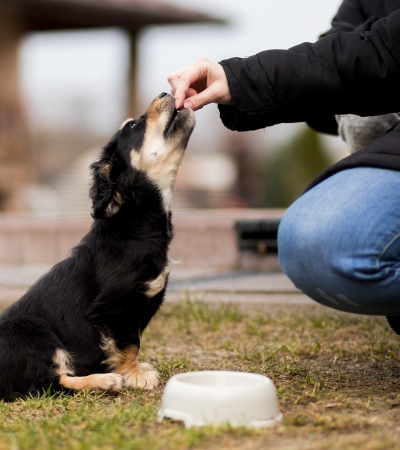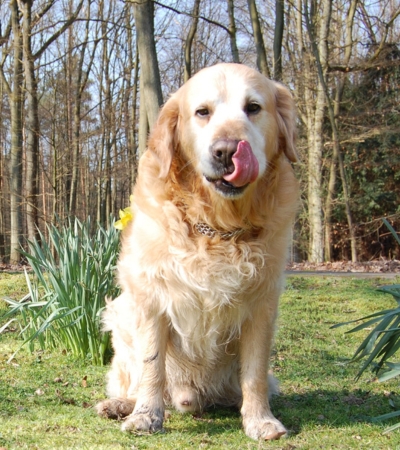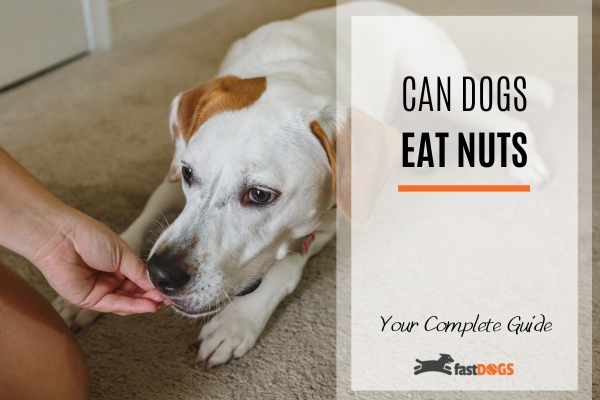Can Dogs Eat Almonds?

Can dogs eat almonds? It's a question that has been bugging dog owners for years. After all, who can resist those adorable puppy eyes begging for a bite of your almond snack? But, before you hand any over to your furry friend, let's take a closer look at the facts.
Almonds may seem like a healthy and harmless treat, but not all human foods are safe for our canine companions. So, how do dogs and almonds fare?Are Almonds OK for Dogs? Contents

Can Dogs Have Almonds?
The answer isn’t a resounding yes by any means.
Almonds aren’t poisonous like some nuts, but still, they aren’t the wisest idea. For six reasons why canines shouldn’t — head down to Why Are Almonds Bad for Dogs? So, instead of almonds, there are many dog-friendly snacks that are both tasty and nutritious.
But what about almond-derived products?
Is Almond Butter Safe for Dogs?
While it's a no for — can dogs eat raw almonds? Surprisingly, almond butter is ok for dogs to eat. However, it should be offered in moderation.
Butter equals high-fat content, just like nuts. This could lead to tummy troubles in the short term and weight gain in the long. Plus, you’ll need to be vigilant when checking the ingredients list — some almond butters are sweetened or contain dog-unfriendly additives, which can be harmful to canines.
Hence, it's best to stick to natural, unsalted almond butter without added sugars or oils.
Can Dogs Have Almond Milk?
Dogs can have almond milk, but, like almond butter, it's important to choose the right kind:
- Organic — because it means the almonds haven’t been exposed to weed killers or other chemicals.
- Unsweetened — additives or artificial sweeteners, like xylitol, aren't good for dogs.
In short, if you want to give your dog almond milk, look for a product with minimal ingredients — as in, water and almonds. And, due to the number of calories, it shouldn’t be a regular thing. Plus, almond milk should never be a replacement for fresh water.

Why Are Almonds Bad for Dogs?
Dogs are known for their adventurous eating habits, but when it comes to almonds, they should steer clear. As much as we may love snacking on these delicious nuts, they can be hazardous to our furry friends — even though they might not be toxic to dogs.
Here, we'll take a closer look at why feeding almonds to dogs is a no-no, and the risks that come with it.
Choking Accidents
Dogs have a habit of swallowing food without chewing it properly, which can lead to choking — particularly when it comes to hard and crunchy treats like almonds. Whole almonds could become lodged in their windpipe, or further down their digestive tract.
Pancreatitis
Almonds contain a great deal of fat that can lead to obesity and, worse, pancreatitis. This disease can cause abdominal pain, diarrhea, weight loss, lethargy, and even death if left untreated. So, if you don't want to see your doggy in pain, skip the almonds.
Salt and Additives
Seasoned almonds may seem like a delicious treat for your dog, but they can contain dangerous levels of salt and additives like garlic or onion. Too much salt can encourage the body to store excess water, plus it’s bad for the heart. Garlic and onions also carry their own toxins. To learn more, check out our guide on Can Dogs Eat Onions?
Bladder and Kidney Stones
Phosphorus is another nutrient found in almonds that can harm your dog's health. Excessive levels can increase the risk of bladder and kidney stones, which can be excruciatingly painful and even deadly in some cases. If your dog is genetically prone to these issues, avoid almonds altogether.
Gastrointestinal Tract Distress
While the odd almond may not pose any issues, dogs struggle to digest them. Hence, too many can cause gastric issues like diarrhea, which isn’t fun for anyone involved. So, altogether keep them out of your pooch’s reach.
Risk of Aflatoxin Poisoning
Last but not least, almonds can also contain aflatoxin, a toxic substance — originating from mold — that can harm your dog's liver and overall health. Although aflatoxin poisoning is rare, it's better to be safe than sorry and avoid feeding your dog any moldy almonds. Symptoms of aflatoxin poisoning can include:
- Vomiting.
- Liver failure.
- Loss of appetite.
- Lethargy.
- Jaundice.

Are Dogs Allergic to Almonds?
Yes, it’s a possibility.
Dogs can be allergic to anything — pollen, dust, and food, including almonds.
Some of the symptoms of food allergies include:
Persistent scratching.
Excessive licking.
Increased shedding.
Rash/hives.
Coughing/wheezing.
Gastric problems — vomiting/diarrhea.
Lethargy.
So, always check with your vet before introducing new foods to your dog's diet.
What To Do if My Dog Ate an Almond?
First of all, don't panic!
Dogs have a knack for getting into things they shouldn't, and almonds are no exception. However, the size of your dog and the quantity of almonds consumed will determine the severity of the situation.
If your pooch has only eaten a few almonds, keep a close eye on them for the next 6 to 12 hours. Watch for any changes in appetite or bathroom habits — if they're not eating or seem to be having trouble going potty, speak to your vet.
If your dog has overindulged in almonds, it's time to call in the professionals.
Excessive consumption can lead to dehydration, so your vet may need to administer IV fluids to get your pup back on track. As mentioned, almonds can cause an intestinal blockage, in which case surgery may be necessary. Remember, prevention is the best medicine.
Keep almonds out of reach of your furry friend to avoid any unexpected snack attacks. And, if your pup does manage to sneak a few nuts, keep calm and call your vet.
Final Thoughts
While almonds might be a tasty treat for us humans, they're not the best option for our furry friends. Almond butter can be shared in moderation, but keep an eye on your pup's tummy. As for almond milk, choose an organic, unsweetened brand without any harmful additives. And, when it comes to raw almonds, just say no.
Now we've explored — can dogs eat almonds? It’s safe to say, it's best to stick to dog-friendly snacks like carrots, apples, or even peanut butter (in moderation, of course). After all, we want our beloved bow-wows to enjoy a long and healthy life filled with tail wags and belly rubs, not stomach aches and trips to the vet.Can My Dog Eat Almonds? FAQs
Are Almonds Poisonous to Dogs
No, almonds are not poisonous to dogs, but they can still cause health problems if eaten in large quantities or whole. So, it's best to keep them away from your pup's diet.
Can Puppies Eat Almonds?
It’s not advisable. Puppies have delicate digestive systems that may not be able to handle the high-fat content of almonds. Additionally, there is a risk of choking or obstruction if the puppy swallows the almond whole.
What Happens If a Dog Eats Almonds?
They may experience various symptoms, such as vomiting, diarrhea, lethargy, loss of appetite, and abdominal pain. The risk of obstruction is also present if the dog swallows the almond whole. Ingesting a large number of almonds can cause salt poisoning or pancreatitis, which can be severe and even fatal if left untreated.
How Many Almonds Is Safe for Dogs to Eat?
There is no safe amount. Almonds are high in fat, which can cause various health problems in dogs, including pancreatitis. Plus, the risk of obstruction or choking is present if the dog swallows a whole almond. Therefore, it's best to avoid feeding your dog almonds altogether.
Which Nuts Are Toxic to Dogs?
Macadamia nuts and black walnuts are two types that are toxic to dogs. So, if you want to treat your pup with nuts, stick to safer options like unsalted, unflavored peanuts, cashews, or hazelnuts in moderation.
To find out more, check out our guide on Can Dogs Eat Nuts?
Will 1 Almond Hurt My Dog?
Probably not, but you shouldn't take chances with your furry friend. It's best to avoid giving any almonds to your dog.

